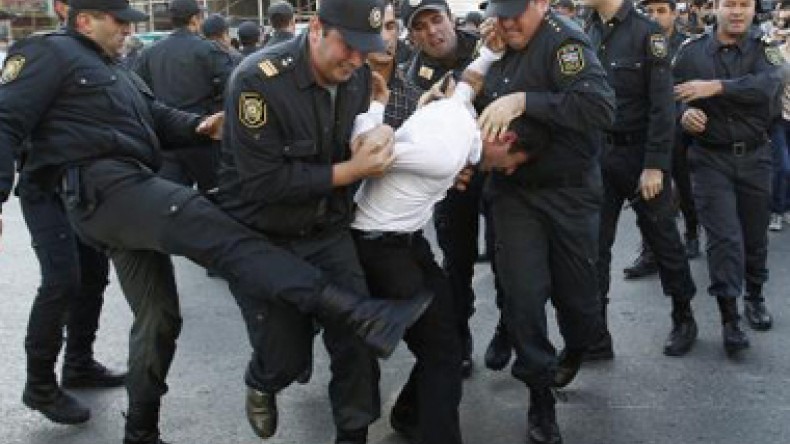
Azerbaijani Authorities use tolerance facade to camouflage serious human rights violations
The government of Azerbaijan claims it supports religious tolerance but in reality seriously restricts freedom of religion or belief. It uses a tolerance facade and denials of reality to camouflage serious human rights violations, reads the Report on religious freedom in Azerbaijan, compiled by the Norwegian Helsinki Committee in cooperation with the news service of human rights organization "Forum 18".
According to the report twelve prisoners of conscience were in January 2015 in jail for their exercise of freedom of religion or belief. Organization "Forum 18" is not aware of a single case where the official, hindering the right to freedom of conscience, was punished.
It is noted in the article that the Government of Azerbaijan also targets persons representing what it describes as a radical Islamic threat, but does not implement the OSCE security concept it is formally committed to. According to this concept, respect for human rights defends national and international security. The authorities have principally targeted less radical elements who have been critical of the regime. Mubariz Qurbanli the head the State Committee for Work with Religious Organisations, in an interview with Trend news agency complained of “minor groups” among Muslims who, he argued, were dangerous and should not be allowed. However he did not identify any alleged terrorist activity.
As a result of a research the authors of the report found out that, Azerbaijani authorities are guided by both arbitrary constraints, and "lawful restrictions" which are often made secretly, and violate the country's international obligations. The legal proceedings are often held with violations, there were cases when the defendants were not notified of them. Officials often use ambiguous or statutory wording.
“The Religion Law – misleadingly called the Law on Freedom of Religion – has been amended 14 times between 1992, when it was first adopted, and the July 2011 changes. Every significant change has imposed tighter restrictions on freedom of religion or belief,” the report reads.
It is also noted that many of these amendments are problematic from the point of view of norms of OSCE and Venice Commission. They not only contradict the accepted international standards recognized by Azerbaijan, but themselves as well.
According to the report, children’s freedom of religion and education seen by authorities as a potential crime. The sale of any literature and other similar products is prohibited. The State Committee has compiled a list of banned religious literature which the Expertise Department – which is responsible for the list – has not made public, despite numerous requests. For sale of religious literature government permit is required. Religious literature is often confiscated at the entrance to Azerbaijan; there are also cases of withdrawal from those leaving the country.
Religious minorities though, especially those wanting to publish in Azeri, face difficulties especially when publishing literature in Azerbaijani. As a result Catholics receive lectionary by e-mail from outside Azerbaijan. Religious minorities also reported that in many regions copy making units refused to copy their literature, either because they are Muslims or because they are afraid of the police.
As result of the research it was also found out that Muslims are subject to specific extra restrictions which do not apply to other faiths. All mosques must belong to the Caucasian Muslim Board. Preventing the gathering of religious communities to worship, the Azerbaijani authorities close or destroy the mosques, mostly those of Sunnis’. In August 2008 a “temporary” ban on praying outside all mosques in the country was imposed, whose text has apparently never been made public.
Georgian Orthodox Church, which operates three of the four churches in recent years was obliged not to worship more than 30 minutes.
Selective denial of legal status also affects non-governmental organisations (NGOs) whose activity is linked to religion of belief in some way. On 12 March 2013, President Aliyev signed into law changes to the Religion Law’s Article 18 banning religious communities from offering or giving blessings or material benefits in exchange for donations, the report reads.
It also goes saying that the situation in the Nakhichevan exclave is worse than in the rest of the country. There is a de facto ban on people exercising freedom of religion or belief on religious minorities. According to Yafez Akramoglu of Radio Free Europe perhaps up to 50 mosques across Nakhichevan appear to have been forcibly closed by the state following the mid November 2014 arrests.
According to the report in Nakhichevan there are some extra formal restrictions on freedom of religion or belief have also been introduced. In Nakhichevan policy on freedom of religion or belief is enacted by the Department for Work with Religious Organisations. Head of Nakhichevan’s Department for Work with Religious Organisations Vuqar Babayev stated that all imams must wear a prescribed uniform. He said two sets of such a uniform and pairs of shoes had been issued to each state-appointed imam. No such uniform is required for imams in the rest of Azerbaijan.
Newsfeed
Videos






























